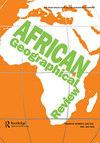Agricultural modernity and popular geographies: the public perceptions of the Coker Farm Settlement landscape
IF 1.1
Q3 GEOGRAPHY
引用次数: 0
Abstract
ABSTRACTThe public geography of the Coker Farm Settlement highlights its existential knowledge and threat to its continued existence. I argue that visualization is crucial in the public geography, which seeks to contest the social alienation of the farm settlement landscape in the state’s agricultural politics of visibility. Employing landscape analysis, this paper explores the origins of the Coker farm, the unfolding visual knowledge of the landscape, and the media representation of a threatened agricultural landscape. This paper contributes to the importance of visualization in public geographies engaged in the agricultural politics of visibility.KEYWORDS: Agricultural landscapeCoker Farm Settlementpublic geographystate cartographypopular geographies AcknowledgmentsI appreciate the editorial guidance of Dr Amber Murrey-Ndewa, discussions with Dr Alex Wafer and comments of the anonymous reviewers, which has improved the earlier manuscript of the paper.Disclosure statementNo potential conflict of interest was reported by the author(s).Additional informationFunding This work was supported by the Emancipatory Futures Studies Project, 2020-2021, Wits University, Johannesburg, South Africa.Notes on contributorsBabatunde A. OgundiwinB. A. Ogundiwin is a PhD student at the University of the Witwatersrand, Johannesburg, South Africa. He holds first and second degrees from the University of Lagos, Akoka, Nigeria. His doctoral research examines interconnections in cartography, landscape studies, and development geography.农业现代性与大众地理:公众对科克农场聚落景观的认知
【摘要】科克农场聚落的公共地理凸显了其存在性知识及其持续存在的威胁。我认为可视化在公共地理学中是至关重要的,它试图在国家农业政治的可见性中对抗农场定居景观的社会异化。本文采用景观分析的方法,探讨了科克农场的起源,景观的视觉知识,以及受到威胁的农业景观的媒体表现。本文认为可视化在公共地理学从事农业可见性政治研究中的重要性。感谢Amber murray - ndewa博士的编辑指导、与Alex Wafer博士的讨论以及匿名审稿人的评论,这些都对本文早期的手稿进行了改进。披露声明作者未报告潜在的利益冲突。本研究由解放未来研究项目(2020-2021)资助,南非约翰内斯堡Wits大学。关于贡献者的说明babatunde A. OgundiwinB.;a. Ogundiwin是南非约翰内斯堡威特沃特斯兰德大学的一名博士生。他拥有尼日利亚阿卡市拉各斯大学的第一和第二学位。他的博士研究考察了地图学、景观研究和发展地理学的相互联系。
本文章由计算机程序翻译,如有差异,请以英文原文为准。
求助全文
约1分钟内获得全文
求助全文

 求助内容:
求助内容: 应助结果提醒方式:
应助结果提醒方式:


